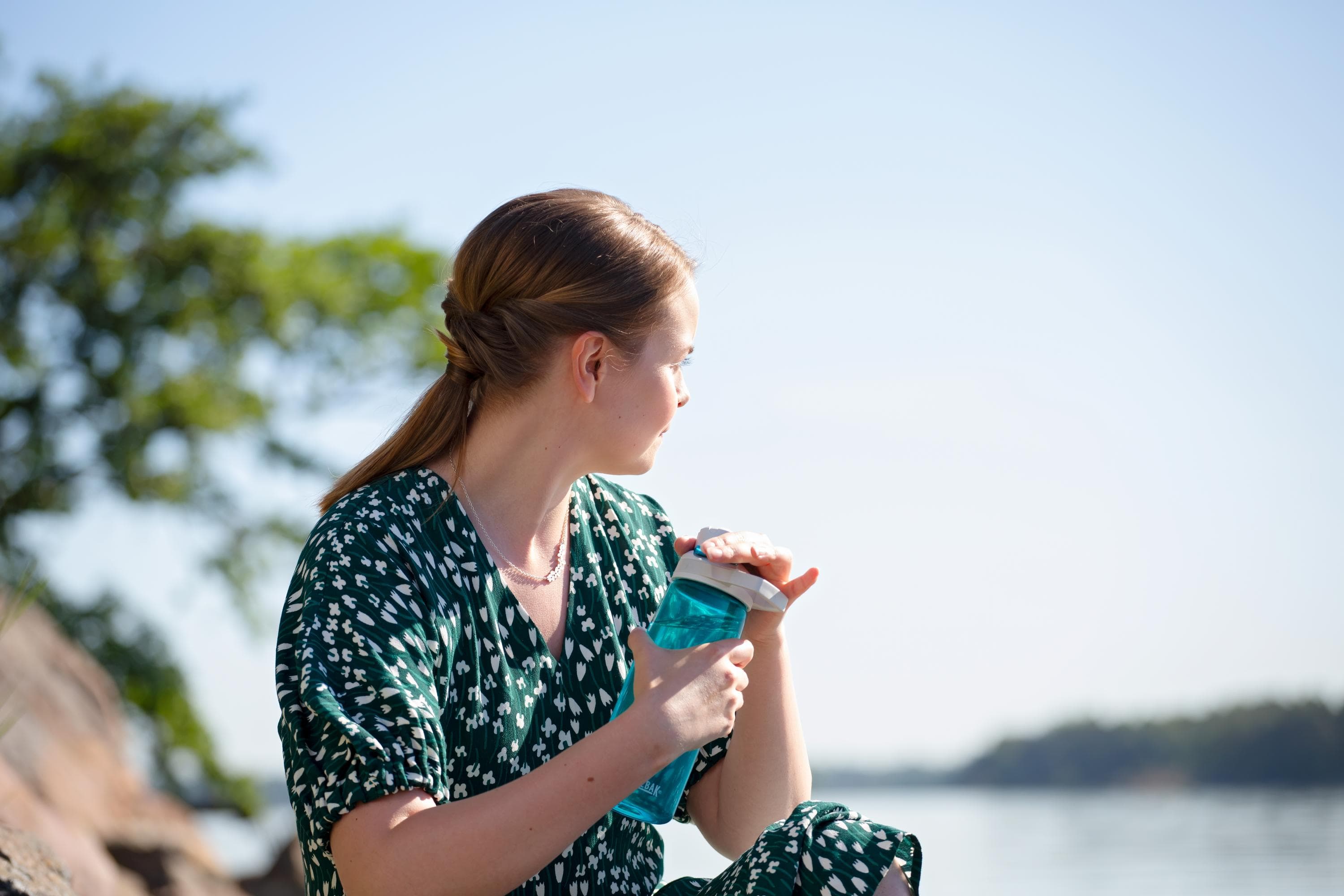Hikers need enough clean water
When you are out hiking, it is important to drink plenty of water. If you do not drink enough you will feel more tired and, in the worst case, this will lead to dehydration, which can be harmful to your health.
An adult normally needs around 2.5 litres of fluids every day. We usually get about one litre of fluids in food and 1.5 litres by drinking. Hot air and heavy exertion increase the body’s need for fluids. Your daily need of fluids may be considerably higher than this when hiking.
When you feel thirsty and your mouth is dry, you are already dehydrated. Starting in the morning, drink regularly during and between meals. In hot weather, it is a good idea to drink a small amount of water every 10-15 minutes. Always keep the water bottle within reach so that you will automatically take sips. When drinking is part of your routine, you won’t forget about it and suddenly find yourself dehydrated.
The most common symptoms of dehydration are thirst, nausea, headaches, muscle cramps, reduced urine output and dark-coloured urine.
Also ensure sufficient fluid intake in cold weather. In the winter, it is difficult to melt snow into water, so it is easy to drink too little. Exerting yourself in warm clothes causes you to sweat and lose moisture, so take off layers as you move. In the winter, keep drinks in a thermos bottle so that they will not freeze. In winter, hikers need to drink at least one litre of warm fluids per day. Drinking cold water consumes energy and cools the body.
On hikes you usually carry drinks in a bottle or flask. The bottle should be clean when filling to prevent any bacteria present from growing. Always rinse your drinking bottle when filling it and wash it daily.
Drinking water is best kept in a cool and dark place. The water will remain potable for 3-5 days. Also pack an extra metal water bottle for a longer hike. In this case, you can boil all the hot water needed for cooking and dishwashing in one go and then store it in the bottle for later use.

Water tips for hikers
- Always keep water in a clean container
- Always find out in advance where you can get drinking water on your hike. The web pages of hiking destinations on Luontoon.fi provide information about drinking water. Find water sources on topographical or outdoor maps of the area.
- Use wells whose water quality has been tested. The test results must be posted near the well.
- Use spring water rather than surface water.
- Do not drink water that smells or tastes strange.
- If you are unsure about water quality, purify it using tablets or boil it for 5 minutes in order to ensure that any harmful microbes are killed.
- Ensure that there are no dead animals or faeces in the water source.
- Bring water filters or filter bags to remove debris.
- Do not use water containing blue-green algae, even when boiled.
- In the winter, look for running water. You can get potable water by melting and boiling snow or ice, even though this water will not contain any important minerals. Take snow from a clean place.
- Drink water taken from nature at your own risk. In Southern Finland and near human population centres, water cannot usually be taken directly from surface water, as the quality of surface waters has been degraded by human settlement, agriculture and industry.
- While out on a hike, wash yourself and your dishes in a way that prevents polluting the waterways in your hiking area.
- Do not wash your dishes in a lake or river. Pour the dishwashing and wash water into a container and, after using the water, pour it onto the ground to be absorbed .
- Do not wash dishes, wash up or dump wash water into a well. This prevents the water source from being contaminated.
- Use a biodegradable dishwashing liquid, shampoo and soap.
- Do not wash your hands or dishes in buckets intended for drinking water or at water supply points. Do not fill your water bottle directly from a drinking water bucket.
More information
Suojellaan kaivovesiä! - Skydda råvattnet!
Suojellaan kaivovesiä! - Skydda råvattnet!
Janoinen kaivolla - Törstig vid brunnen
Janoinen kaivolla - Törstig vid brunnen